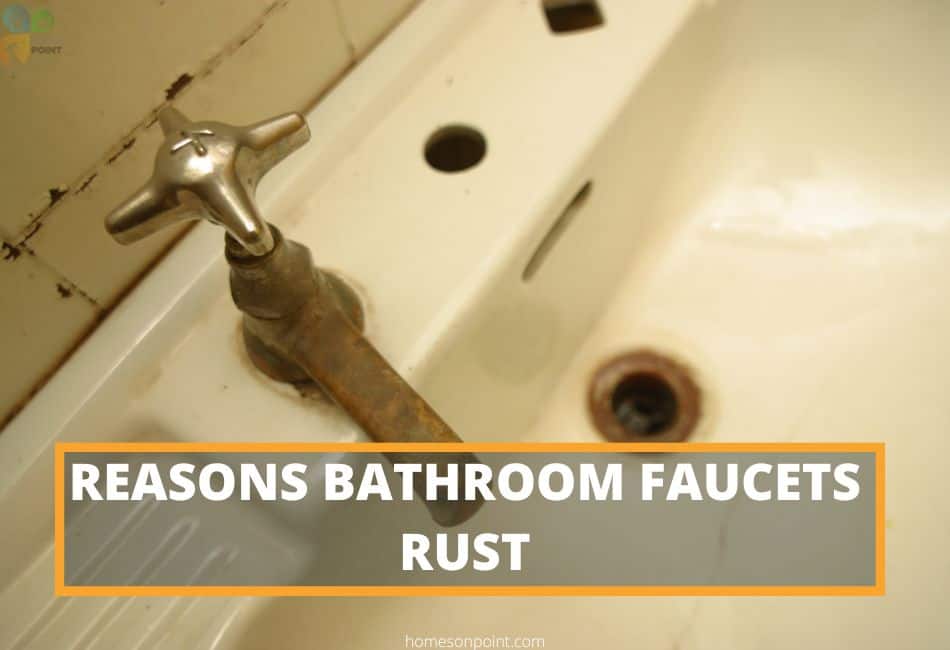Metal parts in the bathroom are constantly exposed to moisture, which makes them susceptible to corrosion. Bathroom faucets are one such metal part that is prone to rust.
Your faucets are an important part of your bathroom. Not only do they provide water for you to clean yourself with, but they also add a touch of luxury and elegance to the room. However, if your faucets are starting to rust, then you need to take action.
Rust damages your faucet aesthetically and functionally and can even lead to leaks from your faucet. In this article, we will discuss the causes of faucet rusting and ways that you can prevent it from happening.
How Rust Develops On Your Faucet
Rusting is the process of corrosion where the metal surface is slowly eaten away by exposure to water and oxygen. This process is accelerated in the presence of salts, which are often found in water. Over time, rust can cause serious damage to the metal, making it weaker and more brittle.
The finish on your faucets is meant to protect the metal underneath, but it can only do so much. If the protective finish is damaged, then the metal is left exposed to water and oxygen, which will cause it to rust.
What Causes Rust On Bathroom Faucets?
Several other factors can contribute to faucet rusting, such as:
1. Hard Water
While hard water isn’t harmful to drink, it can cause problems with plumbing fixtures like faucets. Over time, the minerals in hard water can build up on the surface of faucets, causing them to corrode. Hard water contains high levels of minerals, such as calcium and magnesium. The most common sign of corrosion is a white or blue-green film that forms on the metal. This film is made up of microscopic mineral deposits that have bonded to the metal surface. As these deposits continue to accumulate, they eventually cause the metal to corrode.
2. Scratches And Chips
When the chrome plating on your faucet is scratched or chipped, it exposes the underlying metal to water and oxygen, which can cause it to rust. Even small scratches can provide a way for water to get under the plating and start the corrosion process.
scratches and chips can develop for several reasons. For instance, dropping something heavy on the faucet can also cause chips and scratches.
3. Using Scourers And Abrasive Cloths
While it’s important to clean your bathroom faucets regularly, you should avoid using scourers or abrasive cloths. Some fibrous pads contain microscopic particles of steel that can scratch the surface of your faucet, stripping away the protective coating. Over time, these scratches will become rust spots. Before you realize the damage has been done, the rust will have already set in.
4. Harsh Cleaners
If you use harsh chemicals to clean your bathroom faucets, then you could also be causing them to rust. The chemicals in these cleaners can eat away at the finish on your faucets, exposing the metal underneath. As we’ve already mentioned, exposed metal is susceptible to rusting.
5. Not Cleaning Your Faucets Regularly
If you don’t clean your bathroom faucets regularly, then the dirt and soap scum and mineral deposits from hard water will build up, making them more difficult to remove. An attempt to remove them after a long period will likely result in scratches and chips, which we know can cause rusting.
Again, not regularly cleaning your bathroom faucets means allowing all of these accumulated materials to have enough time to cause damage to the faucet. Leaving spatters to evaporate on the faucet increases the risk of rust. Mostly the damage depends on concentration and contact time.
6. Low-Quality Faucets Or Finish
If you purchase a lower-quality faucet, it will likely have a thinner finish that is more susceptible to damage. This means that it won’t take as long for the metal underneath to get exposed and start rusting.
7. Proximity To The Beach
As indicated earlier, salt accelerates the rusting process. If you live near the beach, then the salt water in the air can also cause your bathroom faucets to rust. Saltwater is very corrosive and seaside regions have a higher concentration of salt in the air. The sea breezes carry salt mist which can settle on bathroom fixtures like faucets and start to corrode the metal. This will not happen overnight but given enough time, salt water can cause serious damage to the faucet metal.
How To Prevent Faucet Rusting?
There are steps you can take to prevent your bathroom faucets from rusting. These include:
1. Clean Your Faucets Regularly
Bathroom faucets are being used every day unless you’ve traveled. This means that there will be constant mineral deposits as well as dirt and grime build-up each day. These need to be cleaned regularly so they don’t have a chance to build up and cause damage.
You should clean your bathroom faucets at least once a week, but more often if you have hard water. Use a soft cloth or sponge and mild soap or detergent to avoid scratching the surface.
If you live close to the beach side, then you should increase the frequency of cleaning to at least twice a week. The more frequent you clean salted air off of your faucets, the better.
2. Consider Installing Water Softener
If you have hard water, then it’s a good idea to install a water softener. This will help to remove some of the minerals that can cause build-up and damage.
A water softener works by exchanging the minerals in hard water for sodium ions. This process is called ion exchange. By doing this, you can help to prolong the life of your bathroom faucets (and other appliances that use water) by preventing mineral build-up.
3. Avoid Using Abrasive Chemicals And Pads
We’ve already mentioned this, but it’s worth repeating. Avoid using harsh chemicals or abrasive pads when cleaning your bathroom faucets. These can damage the finish and expose the metal underneath, which will cause rusting.
Use only mild soap or detergent and a soft cloth or sponge when cleaning. If you have tough deposits, you can use homemade remedies such as white vinegar or baking soda. Rinse the faucet well after cleaning and dry with a soft cloth to prevent water spots.
You can also buy commercial cleaners that are safe for bathroom faucets.
4. Buy High-Quality Faucets
This is a no-brainer, but it’s worth mentioning. If you buy a high-quality faucet, then it will likely have a thicker finish that is more resistant to damage. This means it will take longer for the metal underneath to get exposed and start rusting.
Spend a little extra money upfront to get a better quality faucet and you’ll save yourself money in the long run.
It is worth noting that having a high-quality faucet doesn’t mean you shouldn’t follow the previously mentioned points. Even the best quality faucets need to be cared for to prevent damage.
How To Clean Rust From Your Bathroom Faucet
If you already have a rusting bathroom faucet, then you’ll need to take action to prevent the problem from getting worse. Here are some things you can do:
1. Scrubbing It Off
It is sometimes possible to rub the rust off of your bathroom faucet with basic cleaning supplies. If the rust is only on the surface, then you can try scrubbing it off with a soft cloth and mild soap.
You can also use white vinegar as a natural rust remover. Simply spray the rust with white vinegar and let it sit for a few minutes. Then scrub the rust off with a soft sponge.
2. Use A Commercial Rust Remover
You might also be able to remove the rust with a commercial rust remover. There are many products on the market that are designed to remove rust. You’ll need to follow the instructions on the packaging for the best results. The process is straightforward and doesn’t need any experience.
3. Apply A New Coat Of Finish
If the rust has started to eat through the finish and is exposed to the metal, then you’ll need to sand it down and apply a new finish. Start with a 220 grit sandpaper and work your way up to a finer one. Once you’ve removed the rust, you can begin painting your faucet to give it a new coat of finish.
4. Replace The Faucet
If the rust has completely corroded through the metal, then you’ll need to replace the faucet. This is the last resort and should only be done if the other options haven’t worked.
You can buy a new faucet and install it yourself or you can hire a professional to do it for you.
Final Words
Every faucet made of metal is capable of rusting. Preventing your bathroom faucet from rusting is important to maintain both the function and appearance of your fixture. Rust can cause damage to the finish, exposing the metal underneath which will then accelerate the rusting process.
Rusting is relatively easy to prevent but can be difficult to remove once it’s started. The best way to deal with rust is to prevent it in the first place by following the steps we’ve outlined in this article. If your faucet is already showing signs of rust, then you’ll need to take action to remove the rust and prevent it from coming back. I hope you found this information useful. Thanks for reading.

